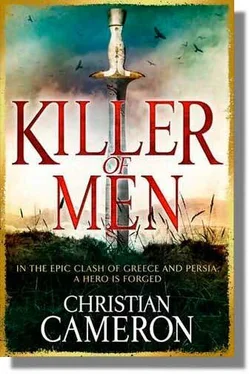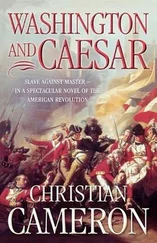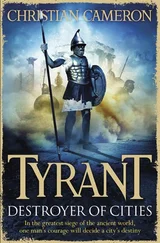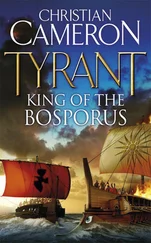Christian Cameron - Killer of Men
Здесь есть возможность читать онлайн «Christian Cameron - Killer of Men» весь текст электронной книги совершенно бесплатно (целиком полную версию без сокращений). В некоторых случаях можно слушать аудио, скачать через торрент в формате fb2 и присутствует краткое содержание. Жанр: Исторические приключения, на английском языке. Описание произведения, (предисловие) а так же отзывы посетителей доступны на портале библиотеки ЛибКат.
- Название:Killer of Men
- Автор:
- Жанр:
- Год:неизвестен
- ISBN:нет данных
- Рейтинг книги:4 / 5. Голосов: 1
-
Избранное:Добавить в избранное
- Отзывы:
-
Ваша оценка:
- 80
- 1
- 2
- 3
- 4
- 5
Killer of Men: краткое содержание, описание и аннотация
Предлагаем к чтению аннотацию, описание, краткое содержание или предисловие (зависит от того, что написал сам автор книги «Killer of Men»). Если вы не нашли необходимую информацию о книге — напишите в комментариях, мы постараемся отыскать её.
Killer of Men — читать онлайн бесплатно полную книгу (весь текст) целиком
Ниже представлен текст книги, разбитый по страницам. Система сохранения места последней прочитанной страницы, позволяет с удобством читать онлайн бесплатно книгу «Killer of Men», без необходимости каждый раз заново искать на чём Вы остановились. Поставьте закладку, и сможете в любой момент перейти на страницу, на которой закончили чтение.
Интервал:
Закладка:
Killer of Men
Christian C ameron
1
The thing that I remember best – and maybe it's my first memory, too – is the forge. My father, the smith – aye, he farmed too, because every free man in Boeotia counted his wealth in farmland – but Pater was the bronze-smith, the best in our village, the best in Plataea, and women said that he had the touch of the god upon him, because he had a battle wound that made him lame in his left foot, and because his pots never leaked. We were simple folk in Boeotia, not fancy boys like Athenians or joyless killers like the men of Sparta – we valued a man who made a pot that didn't leak. When Pater pounded out a seam, that seam held. And he liked to add more – he was always a man to give more than he got, so that a housewife who paid him ten hard-won drachmas and a bowl of potted rabbit might find that Pater had put a carefully tooled likeness of Demeter or Hecate beneath the rim of the pot, or worked her name into the handle of the cauldron or tripod.
Pater did good work and he was fair. What's more, he had stood his ground twice in the storm of bronze, so that every man knew his measure. And for all that, he was always ready to share a cup of wine, so the front of the smithy had become a gathering place for all the men of our little village on a fair day when the ploughing was done – and sometimes even a singer or a minstrel, a rhapsode. The smithy itself was like a lord's hall, as men brought Pater their quarrels – all except his own bloody family, and more of that later – or came to tell him their little triumphs.
He was not much as a father. Not that he hit me more than a dozen times, and every one deserved, as I still remember. I once used my father's name to buy a knife in the polis – a foolish thing, but I wanted that knife. It broke in my hand later – yet another tale, lass – but I meant no harm. When Pater learned that I had pledged his name for a simple blade he'd have made me himself, he struck me with the whole weight of his fist. I cried for a day from the shame.
He had the raising of us all to himself, you see. My mother was drunk from the time I first remember her – drinking away the forge, Pater would say when the darkness was on him. She's your grandmother, lass – I shouldn't speak ill of her, and I'll try to tell her true, but it's not pretty.
She was the daughter of a lord, a real lord, a basileus from down the valley in Thespiae. They met at the Great Daidala in the year of the Olympics, and the rumour of my youth had it that she was the wildest and the most beautiful of all the daughters of Apollo, and that Pater swept her up in his great arms and carried her off in the old way, and that the basileus swore a curse on their marriage.
I respect the gods – I've seen them. But I'm not one to believe that Hera comes to curse a woman's womb, nor Ares to push a spear aside. The gods love them that love themselves – Mater said that, so she wasn't a total failure as a mother, I reckon. But she never did aught to love herself, and her curse was her looks and her birth.
She had three children for Pater. I was the middle one – my older brother came first by a year, and he should have had the smithy and maybe the farm besides, but I never faulted him for it. He had red hair and we called him 'Chalkidis', the copper boy. He was big and brave and all a boy could want in an older brother.
I had a sister, too – still do, unless Artemis put an arrow into her. My mother gave her the name of Penelope, and the gods must have been listening.
I know nothing of those first years, when Pater was as handsome as a god, and Mater loved him, and she sang in the forge. Men say they were like gods, but men say a great many things when an event is safely in the past – they tell a lot of lies. I'll no doubt tell you a few myself. Old man's prerogative. I gathered that they were happy, though.
But nothing ended as my mother expected. I think she wanted something greater from my father, or from herself, or perhaps from the gods. She began to go up in the hills with the maenads and ran wild with other women, and there were words in the forge. And then came the first of the Theban years – when the men of Thebes came against us.
What do you know of Thebes? It is a name in legend to you. To us, it was the curse of our lives – poor Plataea, so far from the gods, so close to Thebes. Thebes was a city that could muster fifteen thousand hoplites, while we could, in an emergency and freeing and arming our most trustworthy slaves, muster fifteen hundred good men. And this is before we made the Great Alliance with Athens. So we were a lonely little polis with no friends, like a man whose plough is broken and none of his neighbours have a plough to loan.
They came at us just after the grain harvest, and the men went off to war. Whenever I hear the Iliad, thugater, I weep when I hear of mighty Hector's son being afraid of his father's shining helmet. How well I remember it, and Pater standing there in his panoply, the image of Ares. He had a bronze-faced shield and a splendid helmet he had forged himself from one piece of bronze. His horsehair plume was black and red for the smith god. He wore a breastplate of solid bronze, again of his own making, and thigh guards and arm guards of a kind you scarcely see any more – aye, they were better men. He carried two spears in the old way, and long greaves on his legs, and when he stood in the courtyard with the whole panoply he gleamed like gold.
Mater was drunk when she poured the libation. I can see it in my head – she came out in a white chiton, like a kore going to sacrifice, but the chiton had purple stains. When she went to bless his shield she stumbled and poured wine down his leg, and the slaves murmured. And she wept, and ran inside.
So Pater went off to fight Thebes, and he came back carried by two men on his chlamys and his spears, and his shield was gone. We lost. And Pater lost most of the use of his left leg, where Mater spilled the wine, and after that there was nothing between them but silence.
I suppose I was five. Chalkidis was six, and we lay in the loft of the barn and he whispered to me about Pater's part in the battle and about our cousins – the grandsons of Pater's father's brother. Aye, thugater, we count such relations close in Boeotia. Pater had no brothers – his father must have read Hesiod one too many times – and this batch of surly cousins were the nearest relations I had on Pater's side. On Mater's side they scarcely allowed that we were kin – until later, and that's another tale, but a happier one.
My brother said that Pater was a hero, that he'd stood his ground when other men ran, and he saved many lives – and that when the Thebans took him, they hadn't stripped him, but ransomed him like a lord. I was young and I knew nothing of ransom, only that Pater, who towered over me like a god, was unable to walk and his mood was dark.
'The other Corvaxae were the first to run,' Chalkidis whispered. 'They ran and left Pater's side open to the spears, and now they slink through the town and fear what Pater will say.'
We were the Corvaxae – the men of the Raven. Apollo's raven. Look up, lass – there's the black bird on my aspis, and may the gods send I never feel it on my arm again! You know what the sage says – count no man happy until he is dead. I pour a libation in his memory – may his shade taste the wine.
The black bird is also on our sails and on our house. I was five – I knew little of this, except that I knew that Pater told me it was a good omen when a raven landed on the roof of the smithy. And our women were Corvaxae, too – black-haired and pale-skinned, and clannish. No man in our valley wanted to cross my mother, or my sister, in their day. They were Ravens of Apollo.
Читать дальшеИнтервал:
Закладка:
Похожие книги на «Killer of Men»
Представляем Вашему вниманию похожие книги на «Killer of Men» списком для выбора. Мы отобрали схожую по названию и смыслу литературу в надежде предоставить читателям больше вариантов отыскать новые, интересные, ещё непрочитанные произведения.
Обсуждение, отзывы о книге «Killer of Men» и просто собственные мнения читателей. Оставьте ваши комментарии, напишите, что Вы думаете о произведении, его смысле или главных героях. Укажите что конкретно понравилось, а что нет, и почему Вы так считаете.












